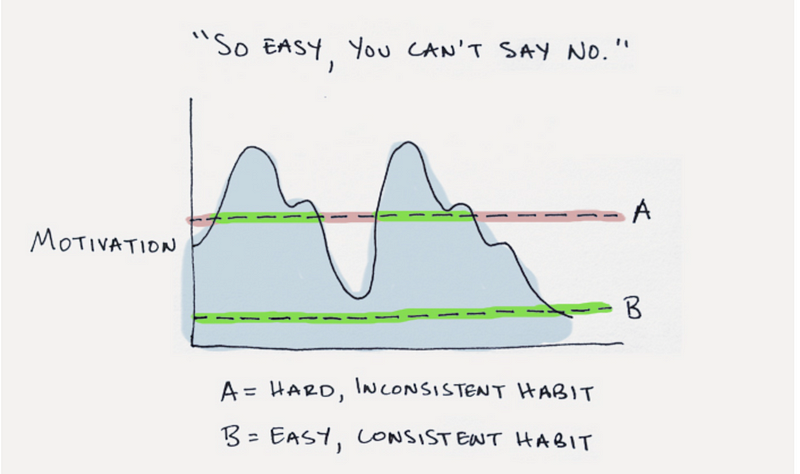Mastering Habit Formation: A Practical Guide to Change
Written on
Chapter 1: The Reality of Habit Development
Building a new habit or eliminating an undesirable one can be quite challenging. Contrary to popular belief, the idea that you can establish a habit in just 21 days is a myth. Research indicates that the timeframe can vary from 18 to 254 days, but for simpler habits, I find that 66 days is often the sweet spot. It requires consistent practice and repetition over this duration.
What constitutes a practical habit?
In my view, a practical habit is about waking up each day with intention. It involves engaging in activities that bring you joy and contribute positively to the lives of those around you.
Here are a few examples of practical habits:
- Flossing daily
- Ensuring 8 hours of quality sleep
- Completing 20 push-ups each day for over a month
- Increasing vegetable intake
- Drinking at least 3 liters of water daily
- Practicing mindfulness
- Cultivating a reading habit
I find that my ideal timeframe for forming or breaking a habit ranges from 35 to 66 days, depending on my goals. Everyone's brain develops new neural pathways at different rates when forming a habit.
Having completed numerous 30-day challenges, my brain has adapted to recognizing that when I embark on a new endeavor, I will commit to it for at least 30 days. Initially, I don’t encounter much resistance, though your experience may vary based on your willpower.
List of 30-Day Challenges You Can Initiate Today
My understanding of a habit is that it is a repeated action or behavior that ideally operates on a subconscious level.
Consider this: what is the first thing you do each morning? Most likely, it’s brushing your teeth—a habit ingrained in us over many years, requiring no conscious thought.
A practical habit is one that adds value to your life, such as maintaining oral hygiene or developing a reading routine, which depends significantly on the material you choose. Regular exercise and effective time management also qualify as practical habits.
Three Fundamental Components of Habit Formation
- Cue
- Routine
- Reward
For instance, if your aim is to take a daily walk, your cue might be your alarm going off. The routine would be the walk itself, and the reward would be the endorphins that elevate your mood after enjoying nature.
How to Establish a New Habit
Begin with your WHY. Consider what motivates you to adopt this habit and what issue you wish to address. It's crucial to set a specific, measurable goal. For example, if you're aiming to improve your cardiovascular health, you might decide to walk 10,000 steps daily, perhaps using a smartwatch to track your progress.
You don’t need a gym; simply walking activates your beneficial genes. As Deepak Chopra suggests, adding yoga can further enhance your routine.
Let’s take the example of building a reading habit:
- Step 1: Cue - Place a book on your nightstand.
- Step 2: Routine - Commit to reading 10 pages before bed.
- Step 3: Reward - You gain new knowledge and improve your sleep quality.
Start Small
Make it so simple that you can’t decline. — Leo Babauta
Begin with manageable steps and gradually increase your commitment—perhaps adding 1-2 pages each day to your reading goal. Consistency is key!

Credit: James Clear
"You do not rise to the level of your goals. You fall to the level of your systems." — James Clear
My Journey
I struggled with establishing a writing habit. I often spent more time reading about writing than actually writing. I committed to writing daily for 30 days, a challenge I had successfully undertaken before. However, after 35 days, I found it hard to maintain the habit.
Instead of viewing this as a failure, I initiated a new challenge: writing for 66 days. I designated time in the morning for 60 minutes of writing and another hour in the evening, aiming to read for one hour and write for two.
After over 35 days, writing in the morning became seamless, often leading me to dream about my writing projects.
Book Recommendation
"Atomic Habits" by James Clear is an excellent resource on habit formation. Here's a comprehensive review of the book for your reference.
The Takeaway
We cultivate habits to realize our life ambitions and to enhance our time management. Let’s revisit the three essential steps for building any new habit:
- Cue
- Routine
- Reward
Start small and remain consistent!
Note: Aim to never skip more than two consecutive days. If you do miss a day, simply restart. Life can be unpredictable, so occasional lapses are normal.
Please share your experiences and what strategies have worked for you in developing new habits.
Chapter 2: Language and Communication Skills
In the video "How to Use My Two Cents: American English Idioms & Phrases," viewers can learn various idioms and phrases that enhance their English proficiency.
Chapter 3: Incremental Improvement
The second video, "IMPROVE Your LIFE and Get 1% Better Every Day w/ James Clear," focuses on small, daily improvements that can lead to significant life changes.